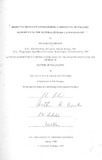| dc.description.abstract | Loss of N via NH3 volatilization during composting of poultry manure reduces the agronomic value of the end-product and contributes to environmental pollution. The objectives of this study were to evaluate N losses via NH3 volatilization during aerobic composting of poultry layer manure, examine the potential of natural zeolites to adsorb the volatilized NH3 during composting, and evaluate the poultry manure-zeolite compost as a controlled-release N fertilizer. Eleven mineral samples were characterized for their physical properties, chemical composition, and NH/ adsorption capacity. The effectiveness of a
clinoptilolite zeolite ZI as an NH/ adsorbent at pH range 4 to 7 was tested. The kinetics of Nl-I, exchange on the zeolite was evaluated at the pH range 4 to 7, initial NH/ concentrations ranging from 70.1 to 1401 mg N L, and a temperature range of 25 to 55°C. Ammonia emissions were measured during composting of poultry manure with zeolites and other amendments in a laboratory composting
simulator. The resulting composts were applied to a sand based medium planted with ryegrass (Lolium multiflorum) where growth, N uptake, and NH/ and N03'leaching were evaluated. The cation exchange capacity (CEC) and purity of the zeolites, with respect to mineralogy and constituent ions, influenced their affinity and adsorptive capacity for NH/. The amount ofNH/ adsorbed increased with increasing pH and NH/ concentration. The estimated NH/ adsorption capacity increased linearly with pH (r = 0.994), ranging from 9660 mg N C at pH 4 to 13830 mg N L at pH 7. Studies on thermodynamics of NH/ exchange on the zeolite Zl indicated a higher activation energy for desorption (5.65 kJ mot') than for adsorption (2.32 kJ mol). Composting poultry manure with 60% zeolite ZI (weight basis) reduced NH3 losses by 44.3%. The compost had total N concentration of 17.04 g N kg and a high NH/ concentration (52.8% of the total N). The 60% zeolite ZI-amended compost treatment produced the highest ryegrass dry matter, N accumulation and N use efficiency compared to the other composts evaluated. Nitrogen leaching losses were low. Although composting poultry manure amended with the natural zeolite c\inoptilolite can reduce N losses to the atmosphere, recycling it for crop utilization, the
cost of the high amount of zeolite required may be prohibitive. | |

